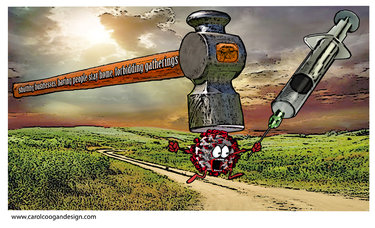Bitter truth is better medicine than sugar-coated placebos.
We have come to rely on the nearly daily updates from Albany County on the coronavirus. Early on, after the first two cases were announced on March 12, the county’s health commissioner, Elizabeth Whalen, urged people to look at what was happening in Italy, which she noted was nine or 10 days ahead of us.
We admire Whalen’s calm in presenting the facts. She speaks quietly, but forcefully. “Stay home, save lives,” she urged last week.
On Saturday, Whalen said, “I’m surprised there are still those out there that don’t get they have to stay home.” If the virus were allowed to run its course, she said, the health-care system could collapse.
Whalen is surprised. We are outraged and horrified. Let’s look at the news from Italy, as Whalen suggested, to see what our future — right here in Albany County, New York — might hold.
Reuters reported in mid-March that Italy’s Association of Anaesthesia, Analgesia, Resuscitation and Intensive Care published new guidelines on March 7. Because it expects a “huge imbalance” between the clinical needs of the population and intensive care resources over the next few weeks, it told those in the front lines: Give priority to those with “greater life expectancy.”
That story reported on a former military doctor, who said he has not experienced having to make such hard choices — on who to help live and who to let die — even in war.
On Sunday, The New York Times reported Italy now has more than 53,000 recorded infections and more than 4,800 dead, and the rate of increase keeps growing, with more than half the cases and fatalities coming in the past week. As morgues are inundated, coffins pile up and mourners grieve in isolation.
The United States now has more cases than Italy did when it ordered its too-late lockdown.
It is too late, in our country, to wish the team meant to deal with pandemics wasn’t dismantled two years ago. It’s too late to wish our federal government saw what was happening in December when the coronavirus emerged in Wuhan, China, and went to work producing test kits or getting factories to produce needed ventilators and protective gear.
We have to deal with what we have here and now. The federal government hasn’t provided the test kits that were briefly used in Albany County to test people with symptoms; those tests will now be limited to patients who are hospitalized and for hospital staff who have been exposed to COVID-19.
“We’re calling for more testing kits,” said Albany County’s executive on Sunday. “We have a shortage … I’m begging the federal government … so we can continue to find out who has it.”
Albany County is also short of personal protective equipment that is needed for the doctors, nurses, and first responders serving in the front lines. At least one local company, which formerly made swimsuits, has turned to making hospital masks instead.
At least we have a governor who gets it.
Andrew Cuomo has closed down all nonessential businesses and has sought manufacturers who can make protective gear for health-care workers. He’s gotten the Army Corps of Engineers to find sites that can quickly be changed into hospitals.
“We learned from China. We learned from South Korea, and Italy. The lesson was loud and clear. Do everything you can as soon as you can, and that’s exactly what we've done here in New York,” Cuomo told CNN’s Wolf Blitzer on Sunday. “I can't do anything else. I’m at zero non-essential workers. You can’t go below zero.
The governor also said on Sunday, “The timeline, nobody can tell you, it depends on how we handle it, but 40 percent, up to 80 percent of the population will wind up getting this virus. All we’re trying to do is slow the spread but it will spread. It is that contagious.”
China changed the trajectory, which we have not yet done, the governor said.
But we must.
Last week, Dennis McKenna, president of Albany Medical Center, said that the center is following government directives, “which is now still a containment philosophy.” He went on, “If it turns to mitigation, we’ll shift.”
We hope the governor stays with a containment or suppression strategy. Mitigation attempts to flatten the curve, to make the disease better managed by the health-care system.
But suppression applies heavy measures to get the virus quickly under control. A paper by Tomas Pueyo, “Coronavirus: The Hammer and the Dance,” — based on data collected by citizens in affected countries around the world — argues that, by going hard on suppression right now, the death toll will be in the thousands rather than the millions.
Pueyo writes that some governments, like those in South Korea, Singapore, and China, showed that three to eight weeks of suppression can get the virus under control. He calls this bringing down the hammer — shutting businesses, having people stay home, forbidding gatherings.
Similarly, Yaneer Bar-Yam, an MIT-trained physicist and complexity scientist who studies pandemics, has argued, “The fastest and even the only way to contain COVID-19 in the United States is a five-week national lockdown.”
Those five weeks, Bar-Yam writes, “will give us time to dramatically scale up our supply of COVID-19 test kits and capacity to process them.” After the lockdown, only sick individuals and their immediate contacts will need to be isolated, he says.
“If you hammer the coronavirus, within a few weeks you’ve controlled it and you’re in much better shape to address it,” Pueyo writes. “Now comes the longer-term effort to keep this virus contained until there’s a vaccine.” That’s “the dance,” to keep the virus from breaking out again until vaccinations arrive.
But, Pueyo argues, many countries, including the United States, have so far chosen the mitigation path.
“That means they’re giving up without a fight. They see other countries having successfully fought this, but they say: ‘We can’t do that!’
“What if Churchill had said the same thing? ‘Nazis are already everywhere in Europe. We can’t fight them. Let’s just give up.’ This is what many governments around the world are doing today. They’re not giving you a chance to fight this. You have to demand it.”
He has drafted a petition to the White House and is seeking 100,000 signatures.
Pueyo’s reference to Winston Churchill reminded us of something else the British Prime Minister said, in the third volume of “The Second World War”: “There is no worse mistake in public leadership than to hold out false hopes soon to be swept away. The … people can face peril or misfortune with fortitude and buoyancy, but they bitterly resent being deceived or finding that those responsible for their affairs are themselves dwelling in a fool’s paradise.”
We don’t want to hear false claims that a cure for malaria may solve this problem or that summer weather will end the threat of the coronavirus. We appreciate our county and state leaders giving us a daily dose of the truth.
Now we need to act on the requirements — stay home, save lives.



